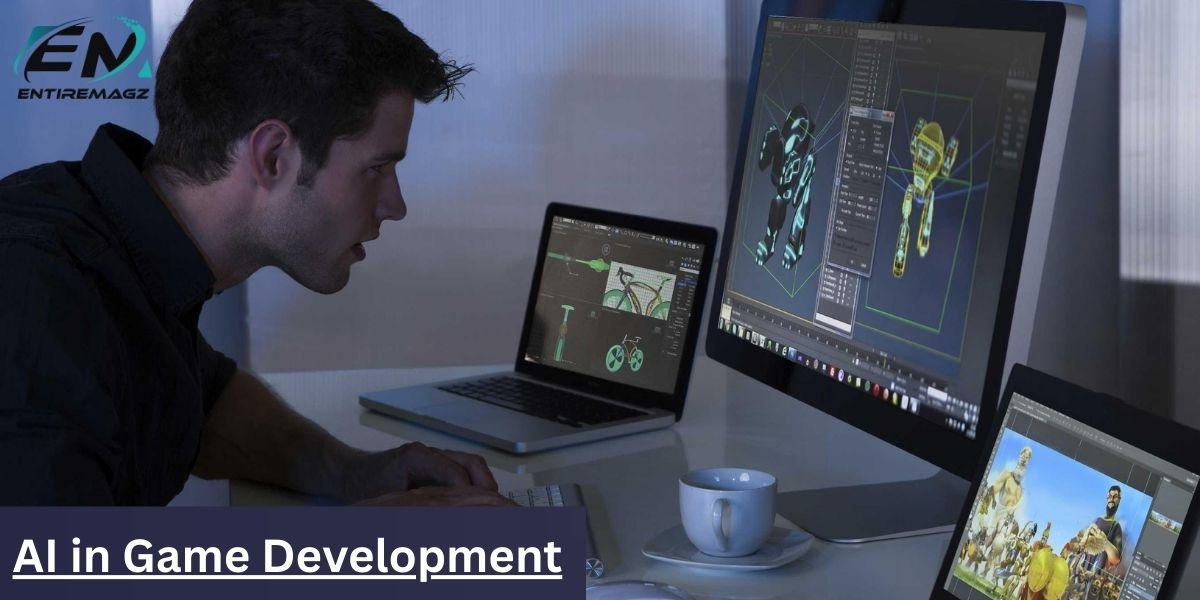Artificial Intelligence (AI) is radically reshaping game development. Game developers are already using AI to increase their workflows; 90% of developers are using this technology to automate repetitive tasks.
They use AI to generate dynamic and procedural content for adaptive gameplay experiences that automatically adjust the real-time to players’ skills and decisions.
AI is enhancing the personalized narratives and offering rich player engagement, smarter NPCs, and immersive worlds.
AI continues to expand every day and is redefining creativity and effectiveness in gaming designs and development.
| Table of Contents 1. What is AI in gaming? 2. The role of AI in Modern Game Design 3. How AI is creating dynamic Worlds and adaptive NPCs 4. What benefits are developers gaining in games with the use of AI? 5. Challenges and Ethical Considerations of Maintaining Originality 6. Final thoughts |
What is AI in gaming?
AI in games is a broad term that involves the technologies that stimulate human-like cognitive functions.
They help in decision-making based on players’ moves, adaptive styles, and different situations in a game. In simple words, it is the concept of AI that is creating enhanced, creative, and interactive experiences in the virtual worlds of players.
Artificial Intelligence (AI) in gaming involves the programming of non-player characters (NPCs) and environments that exhibit behaviors and decision-making. The AI enhances the gameplay far beyond the scripted actions.
The AI breathes life into the digital world and makes game opponents and allies smarter for more predictable and engaging games. AI in gaming is used for various purposes, including
- Realistic NPCs for adaptive player styles and action to enhance the immersion.
- It can adjust a game’s difficulty according to a player’s skill level dynamically.
- AI can enable procedural content generation, such as new levels, landscapes, and challenges.
- It can provide smart game testing and debugging of game performances in an ongoing process.
- Enhancing the storytelling and narrative building according to players’ choices.
The role of AI in Modern Game Design
Artificial Intelligence (AI) is transforming the role of modern game design and helping developers in creating more immersive, dynamic, and personalized gaming experiences. The primary Role of AI in Game Design includes
Procedural and Algorithmic Content Generation
AI automates the complex game assets, including 3D models, textures, outlook, and the whole game world. It not only reduces the developmental process and time but also allows every unique player an expansive and unique environment. For instance, NVIDIA’s GANverse3D is helping in detailed 3D models.
Responsive and Adaptive Game Mechanics
AI analyzes the player behavior in real-time. and it adjusts the Gameplay mechanics and difficulty. The AI has apatitive and responsive systems which ensure the players’ engagement and balance the challenges and accessibility
Non-Player Characters (NPCs)
AI-centered NPCs analyze and learn from players’ interactions and behaviors, in contrast to static or preprogrammed behaviors.
This is how AI adapts naturally with unpredictable and human-like behaviors to enhance the immersion.
Vivid & Enhanced Graphics and Animation
AI creates photorealistic graphics and enhances the textures and features. It also aids in lighting and character animations. It can interpolate the animation data into smoother and lifelike movements.
AI-powered Design and Testing Assistance
The game development process speeds through AI tools that assist in concept art, game levels, design levels, and repetitive testing. The iterations in the games and bugs can be balanced with AI development.
| Machine learning allows the AI bots to train and improve gameplay strategies to speed up 800 times faster than normal play. |
How AI is creating dynamic Worlds and adaptive NPCs?
AI is creating dynamic worlds and adaptive NPCs through advanced machine learning techniques. It uses content generation in real time with environmental modeling to enhance the realism and players’ engagement.
AI Automates the game creation by analyzing real-world data, for instance, forests, urban cities, layout, ecosystems, and landscapes. This allows the creation to look more real with natural factors like water, flowers, and weather changes.
Procedural content generation powered by AI is creating vast, coherent, and unique features according to players’ experiences. It is also ensuring the game continuity with continuous novelty, which makes every aspect of the game fictional and unreal.
AI-based environmental intelligence responds dynamically to players’ actions. It offers environmental factors in games such as weather, migration of wildlife, and transformation of cities at every level of the game.
AI-enhanced NPCs learn from player interaction and adapt accordingly. They act dynamically in coordinating attacks, altering strategies, and reacting emotionally to players’ actions and alliance techniques.
NPCs are not scripted but act as storytelling co-authors. AI generates the narratives and acts according to players’ decisions. The adaptability of such techniques increases the players’ engagement.
| Various games like Cyberpunk 2077 use AI for dynamic NPC dialogueNVIDIA’s GauGAN helps in the area of photorealistic generation.No Man’s Sky represents the AI-based ecosystem. |
What benefits are developers gaining in games with the use of AI?
Developers are gaining multiple benefits from AI integration in game development. They are providing spanning technical, creative, and business advantages to developers around the world.
Improved creativity and Content generation
AI has generative capabilities that design unlimited storylines with real-time creation of new game assets. This develops a highly personalized and emergent gameplay experience and adds more human touch. AI supports content generation with 3D models and creative processes.
Enhanced player engagement
AI investigates the players’ skills and preferences and provides customized gameplay. It can adjust difficulty levels and behaviors according to NPC exhibition. AI reacts to adaptive behaviors and interactions and adds immersion and emotional connection in the gaming world.
Cost-effectiveness
AI reduces the time and resources that are required for manual labor. The game design, assets, and testing processes are made easy with AI-powered gaming developments. The iterative playtesting and finding bugs is faster than traditional human testing.
Advanced gaming designs and Marketing insights
AI is helping developers design and suggest the levels of improvement. The player engagement and layout can be optimized using AI. On the other side, AI is also analyzing the business trends and players’ interests and covering gaps.
AI is helping businesses with game decision-making and better-aligned titles for market demands.
Challenges and Ethical Considerations of Maintaining Originality
AI is not only helping developers in the gaming sector but also transforming different aspects worldwide. When there are benefits, there are challenges and some ethical considerations, so it is used fairly.
- There is the concern of dilution of human creative ownership because AI-generated content sometimes blurs the boundaries between human and machine contributions.
- Sometimes AI-generated content lacks originality and appears generic. This homogenized game design underlays the uniqueness and artistic vision of human designers.
- The AI system often uses pre-existing datasets, which can raise copyright concerns. Studios worry about plagiarism and legal disputes due to AI-generated assets.
- Overreliance on AI can affect the actual creativity and skill development among designers and can marginalize junior roles for repetitive asset creation.
- Third-party AI models can disturb the coherence and consistency in art and style, so studios fail to maintain creative control and cohesion.
- Proprietary assets can be used or leaked while using the AI external tools, which highlights the need for protection of creative content and intellectual property internally.
Final Thoughts
AI has revolutionized the entire game development process. The design, creativity, and dynamic characters with unique traits—AI is helping in all.
AI-based procedural content generation allows developers to add complex and vast gaming characters with unique player interaction. This process is crafting infinite possibilities and fresh possibilities to add experiences in every game played over time.
AI is upgrading NPC behavior, in-depth storytelling, player interest, and engagement. Moreover, AI is maximizing the game difficulty levels in real-time and automating the tasks, which is helping developers to put innovations in gameplay mechanisms.
AI is growing, and it will continue to push, but boundaries and ethical considerations need to be maintained while streamlining development efforts.

